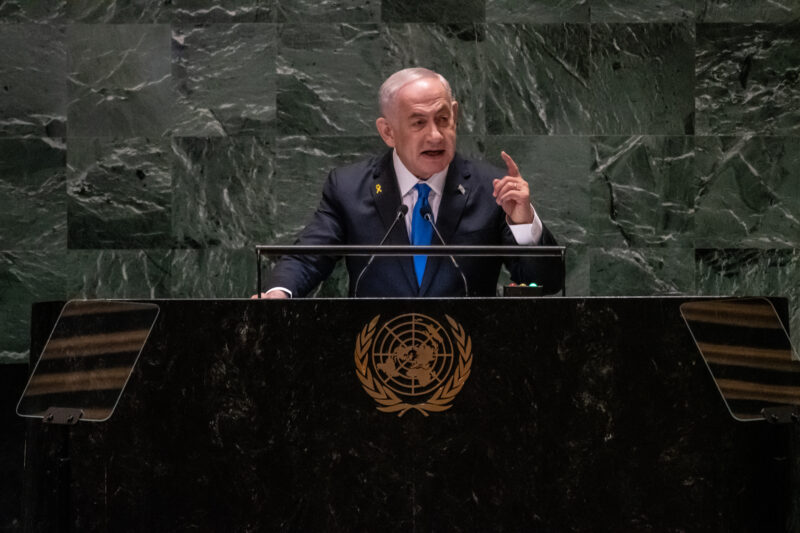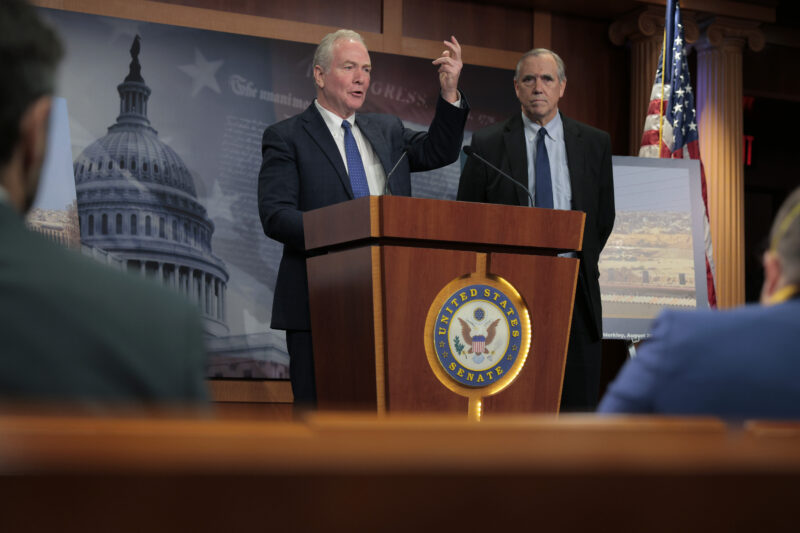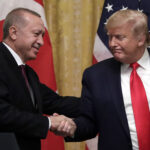Lawmakers take aim at Turkey in 2026 defense bill
House lawmakers introduce series of amendments seeking to place further restrictions on U.S. aid on Ankara over its support for Hamas and hostility toward Israel

Burak Kara/Getty Images
Turkey's President Recep Tayyip Erdogan speaks to supporters at his party’s Istanbul mayoral candidate Murat Kurum's campaign rally on March 29, 2024 in Istanbul, Turkey.
Bipartisan groups of House lawmakers are aiming to crack down on Turkey in the 2026 National Defense Authorization Act, introducing a series of amendments seeking to place further restrictions on U.S. aid to the NATO ally in response to its support for Hamas and hostility toward Israel.
Turkey recently announced its plans to close its airspace to Israeli aircraft and cut off remaining commercial ties with Israel. It has long hosted Hamas leaders, and its leadership has been increasingly hostile toward Israel since Oct. 7, 2023, including threatening to invade the Jewish state. The NDAA, Congress’ annual defense and foreign policy legislation package, is set to come up for debate on the House floor next week.
Reps. Josh Gottheimer (D-NJ), Nicole Malliotakis (R-NY), Dan Goldman (D-NY) and Tom Kean Jr. (R-NJ) introduced an NDAA amendment that would ban any arms sales or transfers to Turkey until the administration outlines how it is ensuring that Turkey is no longer threatening or violating the sovereignty of U.S. allies, providing support to terrorist groups or purchasing any defense systems from U.S. adversaries.
Reps. Gus Bilirakis (R-FL) and Brad Schneider (D-IL) introduced a separate amendment to add new preconditions to the sale of F-35 fighter jets to Turkey, including requiring that Ankara cease cooperation with U.S. adversaries, end its military threats to Israel, cease providing support for Hamas, Hamas affiliates and terrorist groups in Syria and stop targeting Kurdish civilian infrastructure.
Bilirakis and Schneider introduced another amendment imposing similar conditions on the sale of F-16 fighter jets or F-16 upgrade kits, also a controversial issue on the Hill, to Turkey.
Currently, the sale of F-35s is banned under U.S. law in response to Turkey’s purchase and continued possession of an S-400 missile defense system from Russia, but Ankara and Washington have been in negotiations for months about potential pathways to lift that restriction and resume the sale process. The State Department recently denied plans to change U.S. policy on the issue.
An amendment by Rep. Dina Titus (D-NV) would require the U.S., in considering military sales to Ankara, to protect Israel’s Qualitative Military Edge over Turkey.
Bilirakis and Schneider introduced other amendments requiring reports to Congress on Turkey’s targeting of civilian populations in Syria and elsewhere, its support for terrorism and cooperation between Turkey and Iran to evade U.S. sanctions.
Goldman, Malliotakis, Gottheimer, Kean, Bilirakis and Rep. Keith Self (R-TX) introduced another amendment requiring a report on Turkey’s relationship with Hamas and the support Ankara is providing to the terrorist group.
And Goldman, Malliotakis, Gottheimer, Bilirakis and Kean proposed an amendment requesting a report on the Turkish occupation of Cyprus and whether any members of Iran-backed terrorist groups are present or active in Cyprus.
It remains to be seen which, if any, of these amendments will receive consideration or be incorporated into the House’s final draft version of the NDAA.
CUFI Action Fund, the advocacy arm of the Christian pro-Israel group, issued a memo on Wednesday backing the Bilirakis-Schneider amendment on F-35 sales and the Titus amendment on Israel’s Qualitative Military Edge.
“Congress should expand the current F-35 ban beyond the narrow question of Turkey’s possession of Russian missile systems,” Boris Zilberman, CUFI Action Fund’s senior director for public policy and strategy, said in a statement. “The broader issue is Ankara’s sustained pattern of behavior: regional aggression, diplomatic sabotage, and support for terrorism. U.S. defense technology should never be placed in the hands of governments that threaten American allies and enable terrorist activity. That standard should be non-negotiable.”
Zilberman argued that Turkey is “not misunderstood” but instead “is making deliberate strategic choices — choices that undermine American security, compromise our alliances and erode regional stability,” calling Ankara a “revisionist anti-Western power.”
“It is time to stop pretending that [Turkish President Recep Tayyip] Erdoğan’s Turkey is still the ally we want it to be — and start treating it as the adversarial actor it has become,” he continued.
Asked about Turkey’s latest anti-Israel moves, including closing its airspace, Sen. Pete Ricketts (R-NE) told Jewish Insider this week, “Israel is fighting an existential war against a terrorist organization and I would ask all nations to understand just how serious a threat Hamas poses to Israel.”
He said that the U.S. has a “key role” in working with Turkey to ensure that it can work with our other allies, including Israel.
Sen. Mike Rounds (R-SD) added that it’s “always of concern when two of our allies are not getting along,” but declined to comment further.
















































































